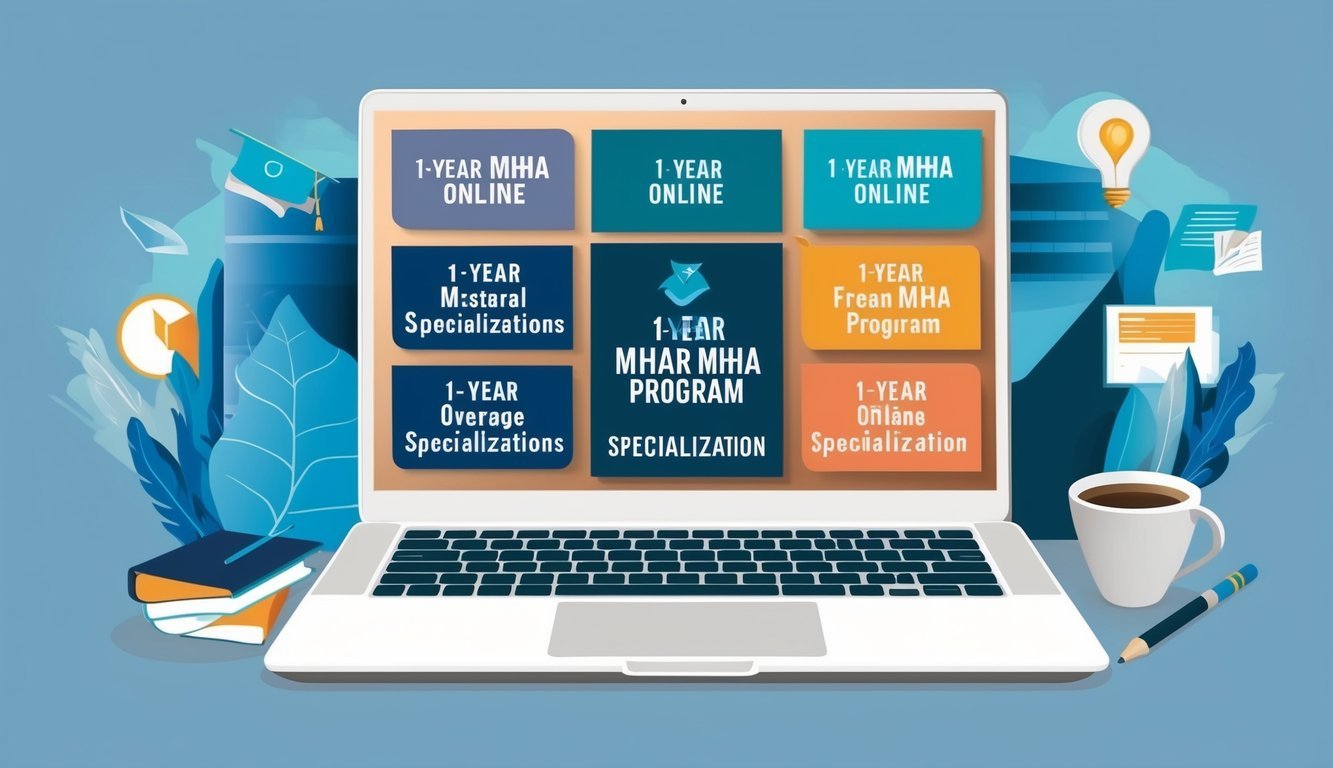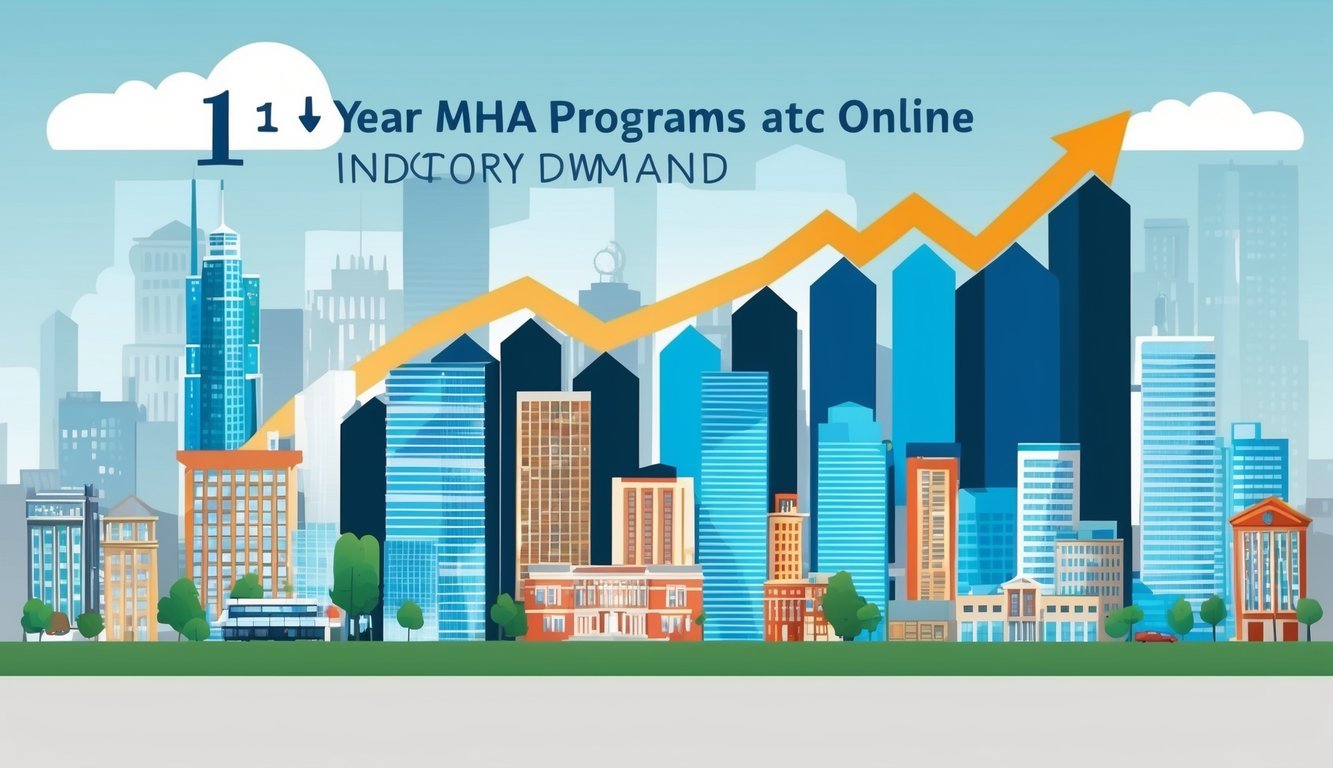With the increasing demand for skilled leaders in healthcare, pursuing a Master of Healthcare Administration (MHA) can be a wise career move. One-year online MHA programs offer a fast-track option for busy professionals to gain the necessary skills and knowledge to advance in the healthcare field.
These programs are designed to fit your schedule while providing a comprehensive education that covers essential management and policy topics.
You may wonder what it takes to enroll in these programs.
Admission requirements typically include a bachelor’s degree and possibly some work experience in healthcare.
The curriculum often includes courses in healthcare finance, ethics, and leadership, allowing you to tailor your learning to your career goals.
Many programs also offer specializations to deepen your expertise.
As you consider financing your education, various options such as scholarships and financial aid are often available.
Graduates of one-year online MHA programs find themselves in high demand, as healthcare management roles continue to grow in our evolving industry.
Overview of One-Year Online MHA Programs

One-year online MHA programs are designed for students seeking to quickly advance their careers in healthcare management.
These programs offer an accelerated path to obtaining a Master of Health Administration, focusing on key leadership and management skills needed in the healthcare industry.
Defining Accelerated MHA Programs
Accelerated online MHA programs allow you to complete your Master of Health Administration degree in a shorter timeframe, typically within 12 to 18 months.
These programs provide a condensed curriculum compared to traditional master’s degrees, which often take two to three years.
Many programs require between 30 to 36 credits, streamlining learning through focused coursework.
You will engage in subjects like healthcare policy, finance, and organizational behavior, preparing you for various roles in healthcare management.
Institutions like Western Governors University offer structured course plans tailored for fast-paced learning.
Benefits of One-Year Programs
One-year online MHA programs offer several enticing advantages.
First, they allow you to earn your degree quickly, enabling you to enter or advance in the job market sooner.
Additionally, the online format provides flexibility, allowing you to balance your studies with work or other commitments.
Many programs also feature networking opportunities, connecting you with industry professionals and peers, enhancing your career prospects.
The average salary for individuals with an MHA degree is approximately $77,000 annually, making this investment worthwhile.
By enrolling in a one-year program, you can gain the knowledge and skills needed to excel in healthcare management.
Admission Requirements and Application Process

When applying for a one-year Master of Healthcare Administration (MHA) program online, you will encounter specific requirements.
These usually include educational prerequisites, standardized testing conditions, and the need for a personal statement.
Understanding these components will help streamline your application journey.
Educational Prerequisites
To qualify for an online MHA program, you must possess a bachelor’s degree.
This degree should be from a regionally accredited institution.
Programs often prefer degrees in healthcare, business, or related fields.
Some schools may consider diverse backgrounds as long as you can demonstrate relevant skills.
Make sure to check if your undergraduate GPA meets the program’s minimum requirement, usually around 3.0 on a 4.0 scale.
Preparing your transcripts ahead of time is crucial since they are necessary for the application.
Standardized Testing and GRE Scores
Some online MHA programs require GRE scores for admission, while others do not.
If the program you are targeting asks for GRE scores, be prepared to achieve competitive marks.
Each program has its own average score ranges, so it’s wise to research specific requirements.
In many cases, strong performance in your undergraduate studies can compensate for a low GRE score.
Always confirm whether the program you’re interested in has a GRE waiver based on professional experience or previous degrees.
Crafting a Compelling Personal Statement
Your personal statement is a vital part of the application.
It allows you to express your motivations for pursuing an MHA.
Focus on your career goals, experiences, and why you want to study healthcare administration.
Aim for clarity and focus in your writing.
This statement should be compelling and concise, usually about 500-1,000 words.
Highlight relevant experience, such as internships or jobs in healthcare, to strengthen your application.
Make sure your personality and enthusiasm shine through; programs want students who are passionate about healthcare.
Curriculum and Specializations

The curriculum in online Master of Health Administration (MHA) programs is designed to equip you with essential skills and knowledge.
It typically includes a blend of core subjects, elective courses, and practical experiences such as capstone projects and virtual residencies.
Core Subjects in Healthcare Administration
Core subjects provide the foundation for your MHA program.
You will study essential topics such as:
- Healthcare Management: Understand the complexities of running healthcare organizations.
- Health Policy: Explore the regulations and laws shaping the healthcare landscape.
- Finance and Economics: Learn to manage budgets, analyze costs, and understand revenue cycles.
These courses often emphasize strategic planning and quality improvement.
You will also dive into healthcare law, gaining insights into compliance and legal responsibilities.
This groundwork prepares you for advanced topics and real-world challenges in the field.
Elective and Specialization Courses
Elective courses allow you to tailor your education to fit your career goals.
Common areas of specialization include:
- Population Health: Focus on improving health outcomes for communities.
- Healthcare Analytics: Learn to interpret data for better decision-making.
- Health Information Technology: Explore the integration of IT in healthcare systems.
These courses give you opportunities to apply your knowledge in specific contexts.
You might study advanced topics in healthcare economics or pursue innovative practices in health policy.
This flexibility lets you shape your expertise and align it with job market demands.
Capstone Projects and Virtual Residencies
Capstone projects are critical components of your MHA program.
These projects challenge you to apply what you’ve learned in a practical setting.
You may work on real-world problems in healthcare administration, focusing on areas like quality improvement or strategic initiatives.
Virtual residencies further enhance your learning experience.
They provide exposure to real-life scenarios, allowing you to collaborate with peers and industry professionals.
This hands-on approach builds your confidence and prepares you for employment in healthcare settings.
You can apply theoretical knowledge to practical challenges, making you a more effective leader in the field.
Financing Your MHA Degree

Financing your Master of Healthcare Administration (MHA) program can seem daunting, but understanding your options can make the process easier.
Explore financial aid, scholarships, and federal assistance to support your educational journey.
Understanding Financial Aid and Scholarships
Financial aid can help bridge the gap between your resources and tuition costs.
This assistance comes in various forms, including grants, loans, and scholarships.
Types of Financial Aid:
- Grants: Money you don’t have to repay, often based on financial need.
- Loans: Borrowed funds that need to be repaid with interest.
- Scholarships: Financial awards based on academic achievement, demographic background, or specific criteria.
You should research various scholarships related to healthcare administration to find one that meets your qualifications.
Many schools offer scholarships, but external organizations may provide additional options.
Always check eligibility requirements and application deadlines to maximize your funding opportunities.
Federal Aid and the FAFSA
To access federal financial aid, you must complete the FAFSA.
This form determines your eligibility for federal grants, work-study opportunities, and loans.
Steps to Complete the FAFSA:
- Gather financial information, including tax returns and bank statements.
- Fill out the FAFSA form online.
- Submit the form before your school’s deadline.
By completing the FAFSA, you may qualify for programs like the Federal Direct Loan or the Pell Grant.
Remember, many states and schools also use FAFSA information for their own assistance programs.
Don’t miss out on potential funding by failing to apply.
Career Outcomes and Industry Demand

Pursuing a one-year MHA program online opens up a range of career opportunities in the healthcare sector.
The demand for skilled professionals in healthcare administration continues to grow, driven by advancements in healthcare innovation and the need for effective management.
Roles for Healthcare Administration Graduates
Graduates of MHA programs can pursue various roles in the healthcare industry.
Some common positions include:
- Medical and Health Services Manager: Oversee healthcare facilities and ensure efficient operation.
- Healthcare Consultant: Advise organizations on increasing efficiency and compliance.
- Healthcare Policy Analyst: Analyze data and policies affecting healthcare delivery.
These roles typically require strong leadership and analytical skills, along with a solid understanding of healthcare regulations and management strategies.
Career Advancement and Salaries
Career advancement is possible with an MHA, as employers often seek candidates with specialized knowledge.
According to the Bureau of Labor Statistics, the median annual salary for medical and health services managers is approximately $104,000.
Here’s a look at some potential career paths and their corresponding salaries:
| Role | Average Salary |
|---|---|
| Medical and Health Services Manager | $104,000 |
| Healthcare Consultant | $85,000 – $150,000 |
| Healthcare Policy Analyst | $70,000 – $120,000 |
These figures can vary based on experience, location, and the specific healthcare setting.
Emerging Trends in Healthcare Management
The healthcare industry is evolving rapidly, resulting in new trends that affect job roles.
- Telehealth: The rise of telehealth services has led to new management roles focused on technologies that support remote care.
- Data Analytics: Organizations seek professionals who can analyze healthcare data to improve outcomes and operational efficiency.
- Value-Based Care: There is a growing emphasis on patient-centered care, requiring leaders who can adapt to new reimbursement models.
Staying informed about these trends can enhance your career prospects and ensure you are equipped for future challenges in healthcare management.
Frequently Asked Questions
If you’re considering a one-year online Master of Health Administration (MHA) program, you likely have specific questions.
Here, you’ll find information about top programs, costs, accreditation, and the potential impact on your career.
What are the top accredited online MHA programs that can be completed in one year?
Some of the leading programs include the University of Saint Francis and Capella University, which offer flexible schedules that can be completed in as little as 12 months.
You can review the details of various programs through resources like NursingProcess.org.
Are there any free online MHA programs that can be finished in 12 months?
Currently, there are no completely free programs for a Master of Health Administration that can be completed in one year.
However, some institutions offer financial aid or lower tuition costs that can help offset expenses.
It’s best to check individual schools for available options.
How do the costs compare among the fastest online Master of Health Administration programs?
Costs for one-year MHA programs can vary.
For example, students at Capella University may pay as little as $9,600, while the University of Saint Francis charges around $18,900.
You can find more details at BestColleges.
Can you provide a list of CAHME-accredited online MHA programs that offer one-year completion options?
Programs accredited by the Commission on the Accreditation of Healthcare Management Education (CAHME) include those from institutions like NYU Wagner.
You can check CAHME’s official website for a comprehensive list of accredited programs.
What is the return on investment for completing an accelerated online MHA degree?
Completing a one-year online MHA program can lead to higher earning potential and greater career advancement opportunities.
Many graduates report increased salaries and improved job prospects within their field, making the investment worthwhile.
How does an online MHA program’s duration impact the career prospects and earning potential?
An accelerated online MHA program often allows you to enter or advance in the healthcare field more quickly.
Completing a degree in one year shows initiative and time management skills.
Employers may value these qualities, which can translate to better job opportunities and higher salaries.

